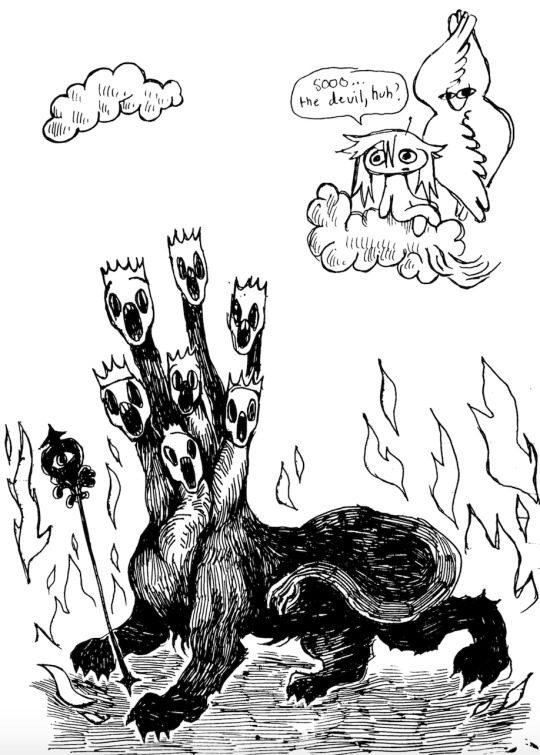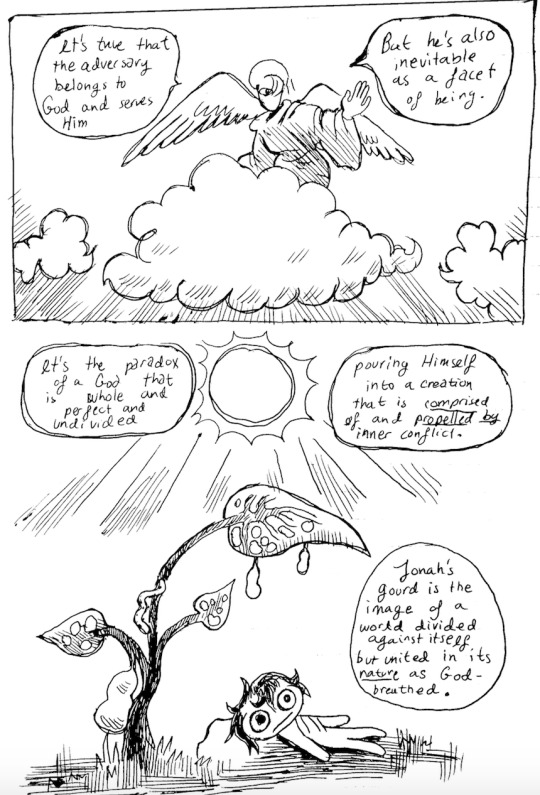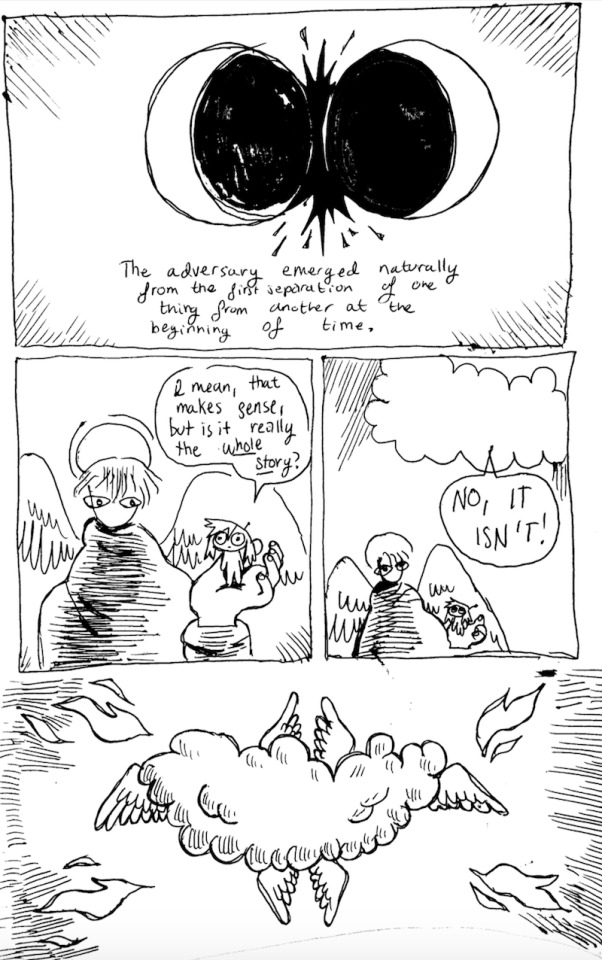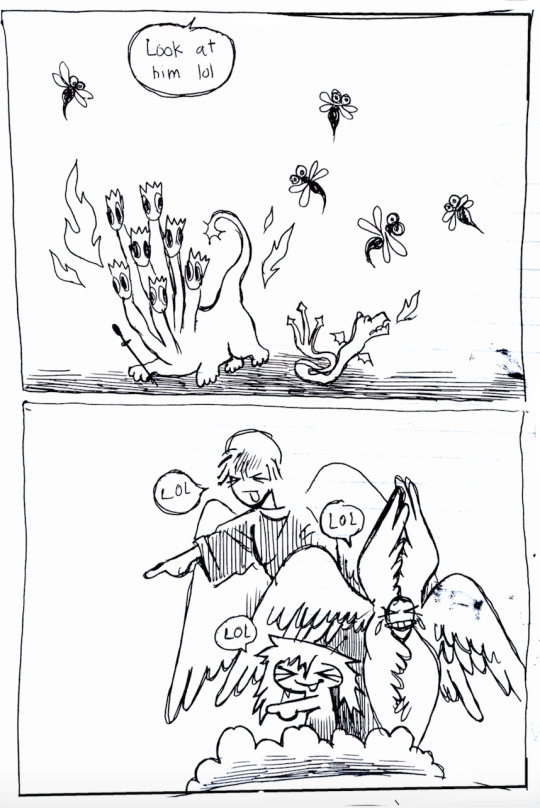#theodicy
Explore tagged Tumblr posts
Text
Hot take: Crowley and God share the same philosophy
Of all characters in Good Omens, Crowley is the one who criticizes God and his/her actions the most. And I find that kind of ironic regarding the fact that their take on free will and morality appears to be essentially the same.
The fandom appreciates Crowley for his own special way of doing evil. He does not try "to spread misery and panic among the humans" like Shax or manipulate people into sinning like Hastur and Ligur. Instead, he relies on humans' tendency for self-destruction. Crowley creates minor inconveniences, like by shutting down the mobile phone network. Inconveniences that could just be shrugged away, but in fact lead to people lashing out on each other. Or he gives individuals with evil deeds on their mind the opportunity to carry them out, like when he turns the paintball guns of the office staff into real ones.

And he is succesful with that. The series does not make it that explicit, but the book clearly mentions how Crowley is far more efficient at collectings souls for hell than demons like Hastur and Ligur. You could say that Crowley is simply doing what he is obliged to do. But his proud face when he tells Hastur and Ligur about the bit with the mobile phone network, when he talks about giving the office staff machine guns, or when he presents his design for the M25 in hell suggests that he is actually enjoying what he does.
Moreover, although Crowley does not do real evil, he still contributes to it, because, as Waller puts it, "[a] person is infinitely more likely to pull the trigger if they are handed a gun" (p. 23; cited below). Does this mean that Crowley is far more demonic than we admit? Not exactly; I think Crowley actually has high moral standards. He is completely opposed to letting innocents - like the kids during the Flood or Job, Job's children and even Job's goats - suffer.

But the thing with people with high moral standards (and I know this from myself) is: they can be pretty cruel to anyone who does not live up to these standards. Crowley firmly believes in "free will, including the right to murder". But in his opinion, that also means that you have to deal with the consequences of your actions. He does not seem to mind the paintball players being arrested for trying to shoot each other, nor does he seem to have a problem with people going to hell for their evil deeds.
To be fair, Crowley acknowledges that sometimes the circumstances force people to do bad things. That's why he saves Elspeth, since he does not want her to "be damned forever" for committing sins out of poverty and desparation.
But apart from that, he sees testing people's morality as his job. Again, this is not explicit in the series, but in the book he considers demons to "occup[y] the same position as tax inspectors" (Pratchett/Gaiman, p. 275; cited below) in the universe. And although he does not want innocents to suffer, that's exactly what happens as a result of him tempting people to do bad things, of giving them the opportunity to hurt others.
But if people pass the test, then that's fine for Crowley, too. We can witness this with Jesus. Yes, Crowley even tried to tempt the son of God by showing him all the kingdoms in the world. But Jesus resisted the temptation and Crowley did not seem upset about it. Actually, he seems to respect Jesus a lot for his good character. He possibly even suspected beforehand that Jesus would resist his temptation and saw it more as doing Jesus a favour, because "his travel opportunities are limited".
And although Crowley is convinced that people should deal with the consequences of their actions, he draws the line where said consequences become to harsh or irrevocable. He expresses this when talking to God in season 1: "I know you're testing them. You said you were going to be testing them. But you shouldn't test them to destruction". Crowley does not want to test people to destruction. That's why he made sure that nobody would actually get hurt or killed in the shooting (if you want to read even more about Crowley's moral philosophy, see this and this post by @linipikk and @ilarual).
What does this all have to do with God? Well, I believe God is doing pretty much what Crowley does: he/she is testing people - by setting up the plan for Armageddon, by allowing Satan to destroy Job's wordly goods and kill his children.

And I think the reason why God does this is quite obvious, if you think about it. Because if someone does good things just because God told them so or because they fear punishment if they don't, then that does not make them a good person, it just makes them an obedient one. To really judge the morality of a person, you need to give them the chance to do evil things. I think Aziraphale got this quite right: "They cannot be truly holy unless they also get the opportunity to be wicked".
Giving people the opportunity to be wicked is what Crowley does when he turns the paintball guns into real ones, and it's also what God does when he/she makes the Apocalypse part of "the Great Plan", thereby offering both heaven and hell a justification for their intent to wage war against each other. The same goes for him/her telling angels and demons alike that "Satan and his diabolical ministers may destroy everything Job owns, no questions asked", assuring them that they won't be punished for harming the poor man or not preventing him from being harmed.
By basically giving them free pass with everything they want to do, God creates an opportunity for people to really show whether they're moral persons or not. And like Crowley, who made sure that the paintball players would not die when shooting at each other, God left a backdoor for saving what is worth saving; he/she is not testing people to destruction. Adam has the power to destroy the world, but he does also have the freedom to reject it. Crowley and Aziraphale have the right to kill Job's children or let them be killed, but they also have the right to refuse to do so.
Nevertheless, God also lets everyone face the consequences - may they be good or bad - of what they did. Again, I find it ironic how much Crowley complains about the injustice of his fall, when it was just the logical result of him joining Lucifer's side. You can clearly see his double standard here - he is fine with the notion of actions having consequences when it comes to others, but not when it comes to himself (for more about Crowley struggling with unintended consequences, see this post).
But back to God: God does not only allow evil to happen (like Crowley does), he/she is also responsible for its existence in the first place. If God created everything, then he/she did also create evil. This does not have to mean that God wants evil to happen, but simply that it is necessary that evil exists so that people can make moral choices, just as Aziraphale explains.
Speaking of creation, there's one last possible parallel that I noticed between Crowley and God. The fandom often refers to Crowley as "The Starmaker". But Crowley didn't create stars, he created "a star factorer". And he seemed especially proud of the fact that it would allow the stars to develop on their own, while most stars would "come pre-aged". He did not determine how they should be, but provided them with everything they needed to grow and then simply wanted to watch them unfold before him.

My suspicion is that God did a very similar thing when he/she created humans (and angels, some of them who would become demons). He/she does barely talk to anybody and does not tell humans, angels and demons what to do. Instead, he/she provided them with everything they needed - including the ability to do both good and evil - and just watches what path they will take.
I think that God wants his/her creations to be free, truly free. That's why he/she made it so easy for Adam and Eve to eat from the Tree of Knowledge, something even Crowley suspected: "What if I did the right thing [i.e. what God wanted] with the whole 'eat the apple' business?" And freedom does necessarily lead to some people misusing said freedom and causing harm to others. But that's the price that comes with it.
Does this make God evil? Well, that's the core of the question of theodicy believers have been struggling with for millenia. I would answer: at least it does not make God any more evil than Crowley.
And that might indicate that some sort of reconciliation between these two characters is possible. In my opinion, there's a high chance that Crowley will come to the conclusion that his and God's take on free will and morality are not so much different and that he will finally be able to make his peace with God.
So, what do you think of my theory/analysis? Do you agree with me about Crowley and God? Or do you interpret the characters and their motivations in a different way? Let me know!
Works cited:
Pratchett, Terry and Gaiman, Neil: Good Omens. The Nice and Accurate Prophecies of Agnes Nutter, Witch. London 2011.
Waller, Rhian: Avoiding a contemporary Apocalypse. Examining the Effects of Shifting Good Omens from its Cold War Context. In: Giannini, Erin and Taylor, Amanda (Eds.): Deciphering Good Omens. Nice and Accurate Essays on the Novel and Television Series, pp. 11-29.
115 notes
·
View notes
Text
For what it means is this, among other things: that for whatever reason God chose to make man as he is—limited and suffering and subject to sorrows and death—he had the honesty and courage to take his own medicine. Whatever game he is playing with his creation, he has kept his own rules and played fair. He can exact nothing from man that he has not exacted from himself. He has himself gone through the whole of human experience, from the trivial irritations of family life and the cramping restrictions of hard work and lack of money to the worst horrors of pain and humiliation, defeat, despair, and death. When he was a man, he played the man. He was born in poverty and died in disgrace and thought it well worthwhile.
Dorothy Sayers on the Incarnation, "The Greatest Drama Ever Staged" (emphasis mine)
#the HONESTY and COURAGE#i encountered this quote in a Keller sermon i was listening to at work so naturally i had to read the whole essay when i made it home#excellent wonderful stuff#pontifications and creations#unto us a child is born#theodicy#be strong and courageous
541 notes
·
View notes
Text
easter reflections with Tolkien's opus: on suffering and theodicy
(continuing from this, from my Ainulindalë meta here)
What seems little can change the course of history down the ages. the melody is 'slow', because History and God's Will are One. it takes the entirety of Arda's time to fully unfold - the only thing he demanded of the Ainur to be incarnate, to live all of it. [...] it is slow for fearful Men who die before seeing Fate unfold in their favor and it is slow for tired Elves who grow world-weary and count mounting losses remembering old glory. but it is God's tempo. True Hope in this sense can only come from not overlooking the lack of goodness in the world and the pain that comes from it - it is truly a moral choice not to fall to despair, because despair is possible, likely or even seemingly impossible to avoid. Being cruel can be easy, and being kind can be hard. in fact, kindness is the most costly choice in a world with cruelty, not just harder - Arda like our own. but without kindness, there is no goodness. God's semblance isn't happy. Perhaps, God suffered first. Perhaps, God suffered most. Does God have choices? Indeed, in Christianity, the suffering and compassion of God is centric. Arda, life, is not Paradise - not even Valinor, that Melkor darkened when becoming Morgoth. and do we not have this very notion in Nienna, in-world? she suffers even for the Black Foe, for whom she has canonical compassion. "Love me when I least deserve it - for that is when I need it most" What the world does have of good, was worth creating, for Him - and thus, it is worth living, for us the Children; it outweights everything else, no matter how desolate it may feel. Nienna's pity is not pointless and sterile; it is constructive and fruitful. God wants the Children to choose kindness, not cruelty. That's the role. That's the assignment. [...] we are warned of this, explicitly: beauty comes chiefly from sorrow, not from 'unspoiled' goodness. good in the world, in Arda Marred, has to be built on top of the ruins where evil wrecked, erased former goodness, and "salted the earth". Houses are rebuilt in a war-torn nation. Orphans are raised by families bereft of their infants, or push their way into apathetic society with little help, because life finds a way. Dignity is restituted to survivors of the most stigmatized and darkest depravity and atrocity; sexual violence, slavery, trafficking. Some communities are re-built under extreme climatic conditions in defiance of nature, where disasters resulted in massive loss of life before. The sorrow is immeasurable, the 'tears are unnumbered'. even if we are overwhelmed by some of the sorrow - it cannot even be fathomed by us. but it can be fathomed by He who is the One who created the world: and he declares evil's victories "vain", pointless, doomed. Morgoth is not only to be defeated on principle, but even by force, he will not succeed. This is the ultimate moral narrative of Christianity and western civ: the Crucifixion, in which God defeats Death, by resurrecting after a series of events representative of ultimate suffering and selfless sacrifice. Tolkien called the Crucifixion the "Eucatastrophe of Human History", Eucatastrophe itself a word he coined that means a sudden event that changes an outcome (eu- added to mean 'for good'). Death(Crucifixion narrative) is not just the end of life, but symbolic of the inexorable limitations of humanity and our desire to escape pain, fate and our desire to rid our loved ones from tragedy and cruelty.
#tolkien#silm#silmarillion#lord of the rings#theology#christian#easter#christianity#catholic#catholicism#crucifixion#resurrection#theodicy#problem of evil#theo-anthropology
13 notes
·
View notes
Text
(40:36) Wow Brennan is REALLY not pulling any punches in this campaign is he? Damn. The real world parallels are real world parallel-ing. I'm not gonna say anything too specific because I don't feel like getting yelled at on the internet at the moment but... a section of a religion that believes that a certain group of people needs to die before the end times can start... hmm where have I heard that one before? Rings a bell.
Also his philosophy schooling is really showing itself here. I hear you dropping those SAT words mister. lol.
#dimension 20#a crown of candy#safe harbor#theodicy#eschatology#acoc spoilers#brennan lee mulligan#philosophy
16 notes
·
View notes
Text
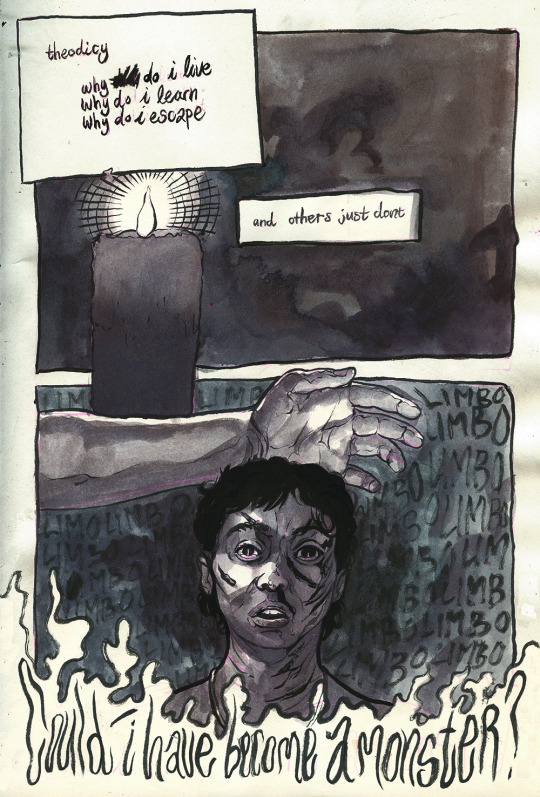
'talk to me' hurt very bad
gotta figure it out somehow
so have this comic
119 notes
·
View notes
Note
how do you keep your faith even while such horrific things are going on in palestine? i've been a christian all my life and i understand that the question of why god allows suffering is one that people have always been asking, that we can never really know the answer to, but it's just so hard for me to see things like this, all of these innocent people being terrorized and murdered in such evil ways, and understand why god can't stop it from happening. in church we pray for both israel and palestine and it feels so pointless, and just makes me frustrated that i can't actually do anything to stop this. especially knowing that even bethlehem, the place of jesus's birth and home to many palestinian christians, is being attacked and churches are being bombed. it seems pretty clear that the people committing these atrocities are never going to open their hearts and stop, and the world leaders who would have the power to make them stop either don't care or directly support them. i do not want to believe that god doesn't exist, or that god would just sit by and watch all of this happen if it were possible to stop it, but it's such a struggle at times like this. i feel like it shouldn't be and like i should've had this figured out by now. it's okay if you don't answer this, i just love your blog and have learned a lot from it over the years, and am incredibly saddened by the state of the world right now.
Hey there, anon. I feel with you and stand with you in your struggle. I also gently suggest you work on letting go of the sense that you "should" have this figured out by now. Firstly because learning to release myself from "shoulds" is something my therapist taught me and it's been super helpful for showing myself love; secondly because I believe it is deeply, deeply faithful to ask these questions, to demand to know where God is in the face of evil — not just once, but continuously across our lives.
If at any point we think we have it "all figured out," if we think we've reached a fully satisfying solution to the problem of how a good God could "let" evil things happen, we're more likely to be numbed by fatalism or become complacent in the face of injustice. As Rabbi Jonathan Sacks (may his memory be a blessing) put it when asked why God lets bad things happen to good people,
“God does not want us to understand, because if we ever understood, we would be forced to accept that bad things happen to good people, and God does not want us to accept those bad things. He wants us not to understand, so that we will fight against the bad and the injustices of this world, and that is why there is no answer to that question.”
Ask the questions. Bring all that you feel — your grief, your confusion, your frustration, your doubt, your fear — to God. Study and pray and converse with others.
And while you're doing all that, and accepting that it'll be a lifelong exploration, act.
Let your love, your words, your actions be the divine response to injustice — because for whatever mysterious reason, God chooses to act through us, through all who follow Their call to "do justice, love kindness, and walk humbly" (Micah 6:8).
___
So yeah, I can't tell you why God doesn't just jump in and stop the evil, why God seems to limit Their own power to intervene (or even to lack that power to begin with), why God respects our free will even when we misuse it to such great harm (though you can see the bottom of this post for places to explore all those questions).
But I can tell you where I believe God is in the midst of all the questions, all the loss, all the suffering — and that's not on some lofty throne indifferently observing our pain; God is right there in the midst of that pain.
Where is God in the face of hate, violence, death? God is co-suffering with us, shouldering the burden with us.
In Exodus 3:7, God says They don't only see the enslaved Hebrews' misery, don't only hear their cries, but that They know the people's suffering — an intimate knowing, as of one who experiences it themself.
In Matthew 25, Jesus tells us that when humanity fails to welcome the stranger, visit the prisoner, feed the hungry, clothe the naked, comfort the oppressed, we fail to do those things for him — for he identifies so intimately with all whom the world calls "least" that he is one with each and every one of them.
So I don't know why God doesn't just fix everything, dammit! — it's the first question I'll be asking Xir when I die, because wtf!!
But I do believe, and I do draw some comfort knowing, that God does not leave us to suffer alone. God is one with the oppressed; God shows ultimate solidarity to the oppressed; and God acts with each of us who act for and with and as the oppressed.
And the good news in the midst in this horror is that there are things that all of us can be doing to act in solidarity with the oppressed!
Our efforts truly are making a difference. Politicians and whole governments across the globe have been startled by the resistance to pro-Israeli propaganda and solidarity with Palestine. The change is slow, but our protests are making an impact. Palestinians have been asking that we keep protesting, boycotting, educating, spreading the word. Because it is helping, slowly but surely.
As long as Palestinians refuse to give in to despair, we too must continue to fight. Palestine will be free. We will not stand silent as genocide occurs.
Boycott as many of the companies named by BDS as you can. Notice that they're focusing on a narrower, more targeted group of companies than some of the enormous lists people keep sharing — that's to help us avoid becoming overwhelmed! So boycott what you can from their list; these are the companies directly contributing to Israel's violence. And spread their list to anyone you can.
If you live in a country with a government that has yet to join the call for a ceasefire — and especially if you, like me here in the US, live in a country that is actively funding/otherwise supporting Israel's violence — call or email your representatives to demand a ceasefire.
Resistbot can help make that easy, in the US at least.
Educate yourself about the history of Palestine and Israel. It's important so that you can recognize lies and propaganda, and also so you can speak knowledgeably about the issue with others. It's also important because understanding and simply bearing witness are two big things Palestinians ask of us. You don't need to know everything, but know enough to bear witness, to remember the loss, and to debunk bullshit when you see it.
Here are some places you can get educated — link to free ebooks; article on current events; article with current perspectives from Gaza; and I've been reblogging news & resources as I see them over on @a-queer-seminarian
Post about what Gaza is going through on social media!! Don't let the fight die down! Talk about it with friends or others you think might be swayed to join the fight if they had the information that most media stations are failing to report on.
Stand up against Islamophobia in all forms.
Stand up against antisemitism in all forms. As Christians, this includes recognizing and uprooting supersessionism in our biblical interpretation, our liturgy, our hymns, etc. It also means learning about Christian Zionism.
One of Israel's primary arguments for the "necessity" of its oppression of Palestine is that Israel is necessary because nowhere else on earth is safe for Jews. They're right that nowhere else is safe for Jews; but they're wrong that Israel is safe for Jews — an settler-colonialist state, a war zone, a state that requires every civilian to serve some time in the military, is not safe for Jews either. But as long as they can point to the antisemitism rampant across the globe, they can use that as an argument. So to counter Israel, and much more importantly to stand in solidarity with Jewish people across the world, don't let antisemitism go unchecked.
Join in protests in your area. Follow Jewish Voices for Peace or Jews Against White Supremacy for info on such events.
Link to places to offer fin.ancial support
Want more ways to act? Check out https://www.palestineaction.org/
___
There is no easy answer to the question of suffering — but even so, it can be helpful to explore it deeper, to examine what conclusions others have drawn over the eras. If you want some resources for your wrestling, here are some:
This post goes into the basics of theodicy, the "the intellectual effort to jerry-rig three mutually exclusive terms into harmony: divine power, goodness, and the experiences of evil"
Then there's my #theodicy tag where I put all posts / links about this issue
I also have a long-ass YouTube video diving deep into "the problem of suffering"!
___
I hope this response brings you comfort and courage, friend. Don't be afraid of questions, of grief, of concern — let them galvanize you for the struggle. Solidarity forever <3
77 notes
·
View notes
Text

All the justifications Christians have come up with for murdering children are nothing more than bad rationalizations.
"The boy's might have avenged their parents if they were spared" -- so might the girls.
"But their parents corrupted them beyond redemption" -- but not the girls?
"It was an act of mercy" . How? Were they in unbearable pain after seeing their parents butchered in front of them?
Oh, and my favorite: "God is goodness itself so anything God does is good by definition." The problem with that reasoning is that it doesn't provide any objective basis for morality. If God decides what is good and what is bad, then what's to stop him from changing his mind? Today helping old ladies cross the street is good and torturing kittens is bad -- but tomorrow God might have a change of heart and make helping old women a capital crime and torturing kittens a religious sacrament. Why should anyone obey God anyways? Because the old prude says we should obey him? But that's just circular reasoning. Even if obeying God were "good", it would have to be good for a reason and then that reason would be the true basis of morality, not your god's capricious whims.
7 notes
·
View notes
Text
It would suck to be God's lawyer. No way He's beating the allegations.
21 notes
·
View notes
Text
The Suffering God
In all religions, a question mark has been set against the omnipotent and serene gods by the sufferings of men. But only in Christ does the concept of a suffering God appear. […] Only in Christ does it become clear that we can put God to death because he has put himself in our hands. Only since Christ has God become dependent on us. Christ did not identify himself with a calm spectator of all our troubles. Christ, by his teaching, life, and death, made plain the helplessness of God in the world; the suffering of unrequited and unsuccessful love. [...] That God in the world has been, and still is, mocked and tortured, burnt and gassed: that is the rock of the Christian faith which rests all its hope on God attaining his identity. This pain is inextinguishable; this hope can never be taken away. What Christians share in common is 'their participation in the sufferings of God in Christ. That is their faith.' In this faith they know that God is helpless and needs help. […] He put himself at risk, made himself dependent on us, identified himself with the non-identical. From now on, it is high time for us to do something for him.
- Dorothee Soelle (Christ the Representative: An Essay in Theology After the 'Death of God,' pages 151, 151-152). Bolded emphases added.
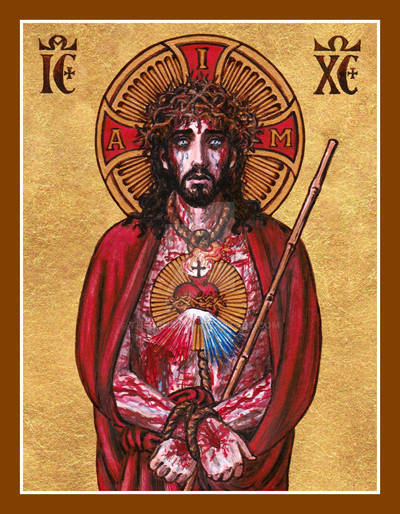
Man of Sorrows, by Theophilia
#Christianity#theodicy#Jesus Christ#Incarnation#vulnerability#compassion#suffering#Sacred Heart#Ecce Homo#Divine Mercy of Jesus#Dorothee Soelle
38 notes
·
View notes
Text
The Philosophy of the Problem of Evil
The philosophy of the problem of evil grapples with the existence of evil and suffering in a world that is often characterized as being created or overseen by a benevolent and omnipotent deity. It raises fundamental questions about the nature of God, the origin and nature of evil, and the compatibility of divine attributes with the reality of suffering.
Key aspects of the philosophy of the problem of evil include:
Existence of Evil: Philosophers examine the existence of evil and suffering in the world, including natural disasters, human cruelty, and personal suffering. They analyze the various forms of evil and the impact they have on individuals and societies.
Theological Implications: The problem of evil raises theological challenges to traditional conceptions of God as omniscient (all-knowing), omnipotent (all-powerful), and omnibenevolent (all-good). Philosophers explore the tension between the existence of evil and the attributes commonly ascribed to God in religious traditions.
Logical Problem: Some formulations of the problem of evil present a logical challenge to the existence of God. Philosophers argue that the coexistence of evil and an all-powerful, all-knowing, and all-good God is logically incompatible. They seek to demonstrate that the existence of evil renders the existence of such a God logically impossible.
Evidential Problem: The evidential problem of evil acknowledges that while the logical problem may not conclusively disprove the existence of God, the prevalence and intensity of evil raise serious doubts about the likelihood of God's existence. Philosophers examine the evidential force of evil in undermining belief in a benevolent deity.
Responses and Theodicies: Philosophers and theologians have proposed various responses and theodicies (justifications for the existence of evil) to reconcile the problem of evil with the existence of God. These include free will defenses, soul-making theodicies, and appeals to divine mystery or higher purposes.
Empirical and Experiential Dimensions: The problem of evil is not merely an abstract philosophical puzzle but also an existential and emotional challenge for individuals grappling with personal suffering and tragedy. Philosophers consider the empirical realities and subjective experiences of evil and suffering in human life.
Implications for Religious Belief: The problem of evil has profound implications for religious belief and existential questions about the nature of reality, morality, and the human condition. Philosophers explore how different responses to the problem of evil shape religious faith, moral outlooks, and existential attitudes.
Overall, the philosophy of the problem of evil engages with deep theological, moral, and existential questions about the nature of the universe and humanity's place within it, challenging us to confront the reality of evil while seeking meaningful responses to its existence.
#philosophy#epistemology#knowledge#learning#chatgpt#education#ontology#metaphysics#ethics#Problem of Evil#Theodicy#Philosophy of Religion#Theological Ethics#Existentialism#Free Will#Divine Attributes#Suffering#Religious Belief#Moral Philosophy#religion#theology#atheism
8 notes
·
View notes
Text
“What is further important is that, through all this exploration, the reality of the Christian existence itself, which is tragically torn between forgiveness and judgment, suffering and victory, and despair and joy, becomes clarified in the life of Christian faith. Our existence is represented by Holy Saturday. As best represented by Steiner’s famous passage we mentioned above, nothing can be said on Friday, the day of great suffering itself. We cannot even afford to try thinking about the meaning of such suffering. On Sunday, nothing needs to be said. Great joy overwhelms the memory of the suffering in the past. Therefore, any decent ‘theodicy’ project, or the earnest questioning of God and search for meaning in suffering, belongs fundamentally to Saturday. This is why we have been hesitant to accept in its totality the kind of ‘theodicy’ which simply claims that even the worst suffering of hell can be redeemed by Christ’s descent into hell (as suggested by a few scholars regarding this subject). If we do not appreciate the waiting in silence, which is the real unique point of Holy Saturday, which is ‘tragic’ waiting in silence characterized by hidden but undoubtedly present victory, there may be no point in discussing the significance of Holy Saturday at all. We could simply stop at the foot of the cross, the horror of which is itself great enough to encompass the worst human suffering.”
—Riyako Cecilia Hikota, And Still We Wait: Hans Urs von Balthasar’s Theology of Holy Saturday and Christian Discipleship
2 notes
·
View notes
Text
Just to clarify my thoughts (since I've had a number of people ask me about it) re: Job and cursing God. There's a big difference between cursing God as used in Scripture and how we generally would think of cursing at God today.
Cursing someone, in the Bible, has a lot of depth to it. It's not just saying "screw you " in anger, it's got a sense of forsakenness to it. It's the opposite of a blessing, a removal of blessing. If the blessing is presence, your face shining on the person you're blessing, then a curse is absence. In some translations, Job's wife tells him to "renounce God and die," which I honestly think makes a lot more sense to modern ears.
Job says a lot of unpleasant things to and about God in his anger and grief. So do the Psalmists. A number of the Prophets. So can we. God can take it if we come to him with honest expressions of our emotion, including those not-so-nice ones directed at him. I don't think there's anything wrong with getting mad at God and saying, "How dare you, you bastard" when you suffer unjustly. You can say much worse, I think, without sinning, though I don't feel particularly inclined to give examples. But as long as it's an honest expression of your heart, I think you're doing exactly what prayer is for. You're presenting him your heart with an open hand. He can use that. Opposite of love is not hate but indifference, etc.
Job doesn't renounce God. Neither should we. But I think when you're truly suffering, you're gonna have those feelings toward God either way. He'd rather you address them with him directly than try to avoid them. Cursing at God in the modern sense is actually a great way to keep the relationship strong and not end up cursing/renouncing him in the Biblical sense.
#i did try to draw that distinction in the original post but I didn't really go into detail#mostly bc i was trying to be concise and just focus on how the church talks to sufferers#so here's the long version#pontifications and creations#only thou art holy#also side note: there was someone yesterday who responded to that post with the suggestion that suffering is generally the sufferer's fault#and it got worse from there#just an absolutely rank response that had me immediately blocking that person and googling if there was a way to remove someone's addition#idk to what degree that person is an active member of this broader christian community we've got going on here#but if you see that post (and you'll know it when you see it) please as a favor to me don't interact with it#there were some lovely responses and additions to that post yesterday too#but that one made me mad#idk. to a certain degree i wanted to vent#they're blocked now though so whatever#anyway. I've sort of been percolating on these various thoughts for a few weeks#since i went to a really fluffy women's talk on suffering#and now i kind of want to give my version#I'm far from the greatest sufferer in the world. i am well aware of that#but as I've been sick I've just done So Much Thinking and reading about theodicy and struggle with God that i feel qualified to opine#unlike the giver of that talk#anyway#tag rant over#...for now#theodicy
205 notes
·
View notes
Text
tolkien meta: the melodic structure of the ainulindale, arda's endgame, and the doom of men
so basically this is about what one can learn and connect to the rest of the legendarium's lore from the ainulindale, and also peer into tolkien's psyche as a side effect i guess. expect excessive theology or more fun imo philosophy of divinity and lengthy tangents about melkor, the nature of evil and theodicy
a small disclaimer - this touches thorny topics in philosophy like the problem of evil, the nature of redemption/salvation, death...
this isn't about my beliefs but presenting and reflecting on tolkien's own within the history of ideas. i acknowledge anyone who reads this also has their own, and can agree or disagree with tolkien. my views may seep in unintentionally but i try to go deeper than that.
pd: I write Eru/One/God indistinctively on purpose. it's for rhetorical emphasis, not so much out of (default cultural) christianity.
part I - introduction (in this post) part II - the themes/structure, discussion part III - discussion (cont): themes of arda and life part IV - discussion (cont 2): theme of the children part V - discussion (cont 3): aftermath/second music
Introduction (i rec reading even if you're versed in the lore)
for those who are not so familiar with parts of the legendarium but still interested in a deep dive, the ainulindalë ("song of the ainur") is the creation myth of tolkien's world.
i rec just reading it if you haven't even if it's after reading this. it's quite beautiful and unique and it's brought admiration even from ppl who study that kind of thing professionally about real cultures. i'm not given to flattery but idk just check it out.
so anyway, the ainur, spirits born from the One creator's mind directly, sang under (or despite) His direction and the melody (both harmony and discord) that resulted, is the history of the world.
by the world we have two concepts here, the entire universe (eä) and the planet (arda) 'earth', of which middle-earth is a later-stage continent. the music itself was a creative process that the ainur partook in before knowing the full implication of their singing.
God showed the ainur the vision of what their music had created and when they saw the world they wanted to live it, to dwell on it and experience it.
God granted this but said they had to remain in it until the full music, the full story had played out.
this includes everything that happens in the Silmarillion, the LOTR movies and sequels/prequels, the TROP series, games, etc, and in some stages of Tolkien's opus, our own world (WWI, WWII, etc).
the Discord refers to the rebellious effect of Melkor on the music as much as his part of the music - the dissonance born from his part's coexistence with the rest of the melody that is in harmony, and takes a 'life of its own'.
this is not unimportant, but i'm not going to discuss it at any point. i will point out here that it has been argued -controversially- by some people to be relevant in compatibilizing or explaining otherwise difficult-to-reconcile lore points that deal with "non-Melkorian evil". this is about things like Ungoliant or the nameless things 'whose mention darken the light of day', whose in-world origins are unclear.
on a broader note, this represents two very different intuitions about evil and divinity (Tolkienian v Lovecraftian, we could say). these are difficult to compatibilize and more than Tolkien's psyche, represent ancient tensions within monotheistic religions themselves, i think. so within Tolkien's world, which has an Abrahamic/monotheistic god, you still find traces of Lovecraftian horror.
all that follows is about Tolkienian evil (meta) i.e. Melkorian evil (in-world), that is uncontroversially and explicitly under the governance of the One, although non-Melkorian evil is a fascinating subject.
#trop#rop#rings of power#the rings of power#lord of the rings#the lord of the rings#silmarillion#lotr#tolkien#ainulindale#music of the ainur#song of the ainur#ainur#ainu#melkor#manwe#apokatastasis#problem of evil#theodicy#christian theology#catholic theology#theology#eschatology#soteriology#redemption#salvation#christianity
32 notes
·
View notes
Text
Brennan with these fucking puns. Veguit priests huh? Ok Brennan, I see you. Veguit / Jesuit ugh. (40:36)
#dimension 20#a crown of candy#safe harbor#first watch#veguit/jesuit#acoc#(40:36)#the profidian heresy#brennan lee mulligan#puns#food puns#theodicy
9 notes
·
View notes
Text
“And because I am happy, and dance and sing, they think they have done me no injury.” [Chimney Sweeper]

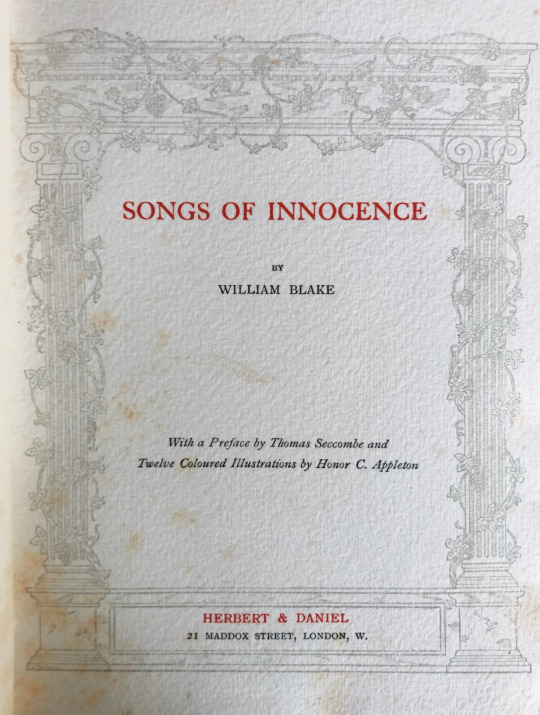


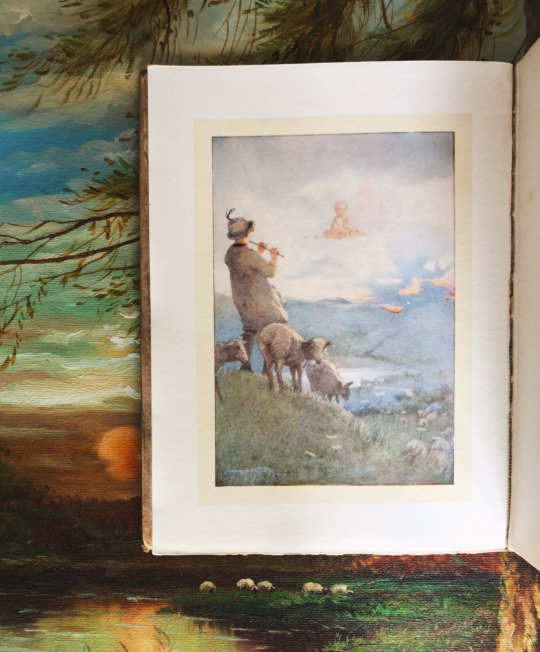



William Blake, a wonderfully exciting poet from the Romantic era, was born in London in 1757 into a working-class family with strong nonconformist religious beliefs. Blakes believe and symbols are continously intervowen in his art. His poetic genius is trying to liberate the instinctual self and to defeat reason. Blake's ethics formulates the originator of morality and religion through the process of liberation. Overcoming phenomenal objectness or fragmentation for the sake of a symbiotic unity of humanity within themselves and peaceful harmony of man with the world.
For every soul-wanderer, reading Blake is a spiritual gift and looking at his visualised art, a dive into cosmic seas of collective psychology. Blake is breaking the lopsided emphasis of idealistic works. In all his gatherings of beauty, there is always a shadow of existential crisis. Even in the following work "Songs of Innocence", the Fall off Paradise is already happening. The violation of nature has begotten: The water is no longer clean and clear. The eternal division of humanity from the divine cosmos as a complex interplay of an individual search for the Holy Grail, is the human idiosyncrasy. The scepticism against rationalism and science is also playing a key role in Blake's work, as he underlines that only “The road of excess leads to the palace of wisdom.” [The Marriage of Heaven and Hell] and that "Art is the tree of life. Science is the tree of death."

Blake condemned the scientific trio of Isaac Newton, John Locke and Francis Bacon as sterile and materialistic. In this painting, (the idea of) Newton- sits on an algae covered rock, making calculations with a compass, like Urizen in Ancient of Days. He might be at the bottom of the sea, or perhaps in a black hole. He might be as Faust, signed a contract with the devil a few moments ago and then lose oneself in a cave, studying minerals and stones.
“The imagination is not a state: it is the human existence itself.”
The work "Songs of Innocence (and Experience)" is a double set of illustrated poems showing “the Two Contrary States of the Human Soul”, the child-like and pure versus the angry and disillusioned (cf. Jung's psychology and the meanings of symbols and archetypes- The shadow of the child is the senex, vice versa). Here we also have dualistic concepts of questioning the being and the problem of theodicy: How could God tolerate the "evil" and why are bad things happening at all? If God is "the loving father" why are the humans deprived of their original goodness? Why is our world still torn between ferociousness of the few and the humble benign of the resisting ones? Through the Fall of Man the unity between man and animal was broken (Gen. 3, 17 - 19), so the seperation is a result of the "evil", which was subsequently brought into the world. An anthropological interpretation could be, that the "Fall of Man" or the "Original Sin" are narratives that memorize our cognitive faculty. First we had to be aware of ourselves and our environment, than we were able to distinguish between different kind of (living) beings. The consciousness aroused questions about ethics, examining motives, motivations and shaping a guideline of virtues (Golden Rule). But throughout the history of generating more insight- of metaphysical speculation and cosmogonic questioning of the creation of the world, it seems difficult to tell what we can really know and what are just guesses. In modern times (but beginning with Xenophanes) the imago of God is excoriated as anthropomorphic. But this statement shall not purport, that our human imagination is nothing less than an illusion and so less than nothing. As Blake wisely interlinks our assumptions with the search for the first principle:
“He who sees the Infinite in all things sees God. He who sees the Ratio only sees himself only. Therefore God becomes as we are, that we may be as he is.”
Poets are the mediator dei, healing the earthly-borns from the abscence of spiritual healing. The humanity got more distrustful torwords ideals and the invisible world, but on the contrary, an individual, who always lacked deep philosophical wondering, is affected and enraptured easily through manipulative groups, who are just imitating religious sentiments, but without soul's salvation. The search of the humankind is an eternal journey to it's cosmic roots, a balancing act between boon and bane, an entanglement of wisdom and folly: Theia Mania.
“In the universe there are things that are known and things that are unknown, and in between there are doors.”
There are some theories and perspectives dealing with the similarity between holiness and madness, found in all world religions. Mania can be the consequence of confrontation with the absolute and infinite, which is overwhelming the human reason and through overstraining, turning them mad. Mystic mania is one of my favourite motifs, it is the breath of prophecy and the ecstasy of poetizing the world of illusions, as a bridge to eternal ideas. It is the idea of intensive love (to God and being), a radical self-denial for unification, a call for liberation. Paradox pairs in Blakes works are continuously expanded,
"Without contraries is no progression. Attraction and repulsion, reason and energy, love and hate, are necessary to human existence."
Blake sets contrasts or he is breaking boundaries, either way he is creating and this energy of creating out of imagination, is considered by Blake as the "only life". ______________________________________________________________ Inspired by Blakes bucolic poetry and hints of a collapsing worlds, I was incited to write a small tribute with the most common motifs of the poetry in "Songs of Innocence".
The Active Evil and Passive Good by Elvin Karda
Dwelling in the arcadia Pure daisies and cle the joyful life Piping songs of pleasant glee A child watches the piper on a cload "Pipe a song about a lamb- Let those tones into the air A reminiscence of a golden land Hidden treasures in ancient sand!" The piper plucks a hollow reed fire tunes his inner song and he stains the water clear walking the rippling stream along In the evening dew The joy is giving way to tears When green shoots turn violet- blue Error is created and eternal what is true
The child's weeping as meek as lamb But vanishes and crumbles into dust As melody clothes the tone in written words Mind and body out of touch Energy is life and like a fountain overflows Active evil is better than told with bad intent passive good
#1910#antiquarian book#world literature#19th century literature#literature#book cover#books#reading therapy#William Blake#romanticism#romantic epoch#romantic literature#poetry#poem#the poet#love as religion#holy mania#heaven and hell#cosmogonic questioning#theodicy#sense of life#between utopia and dystopia#original sin#theories of conscience
20 notes
·
View notes
